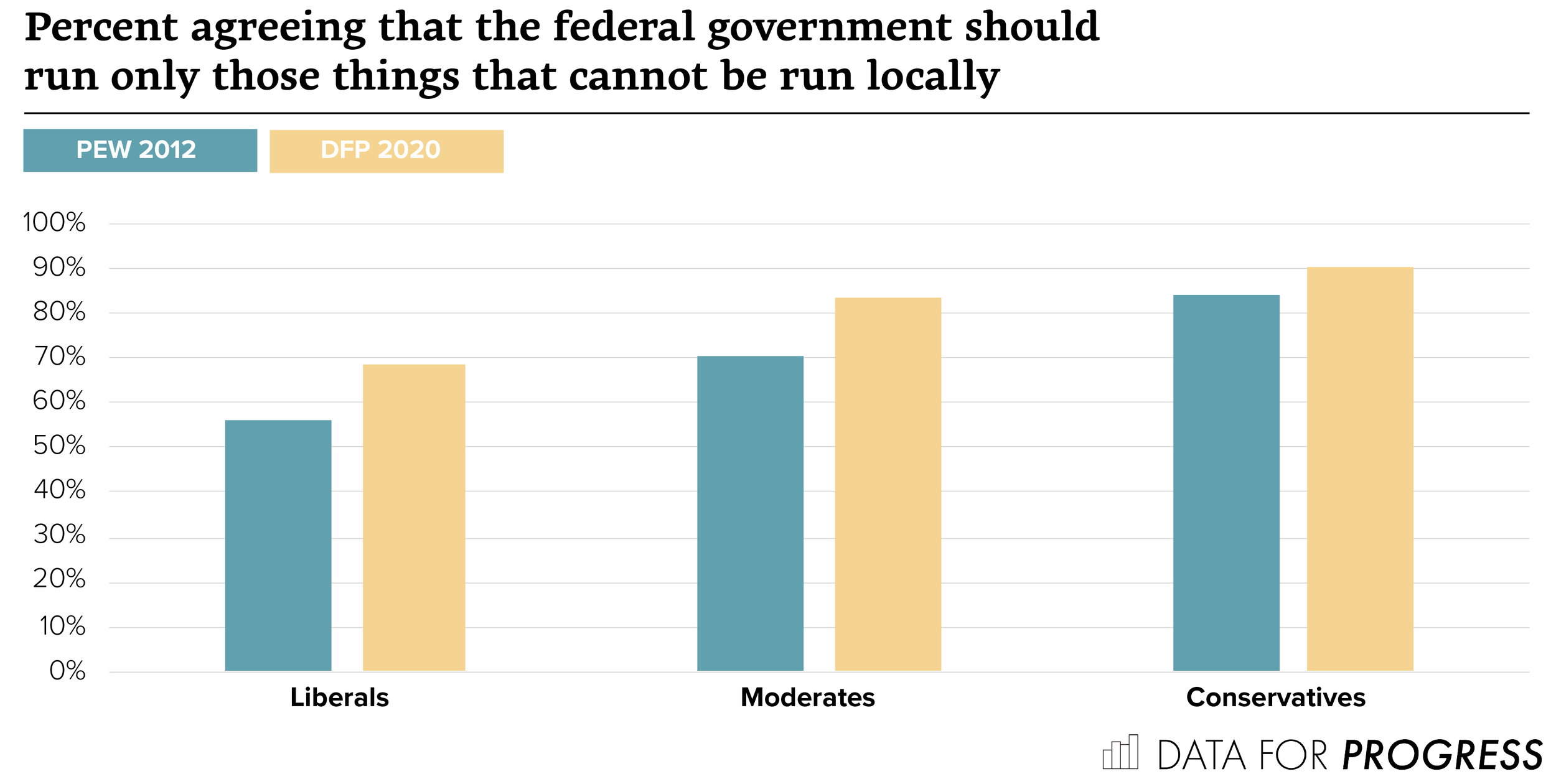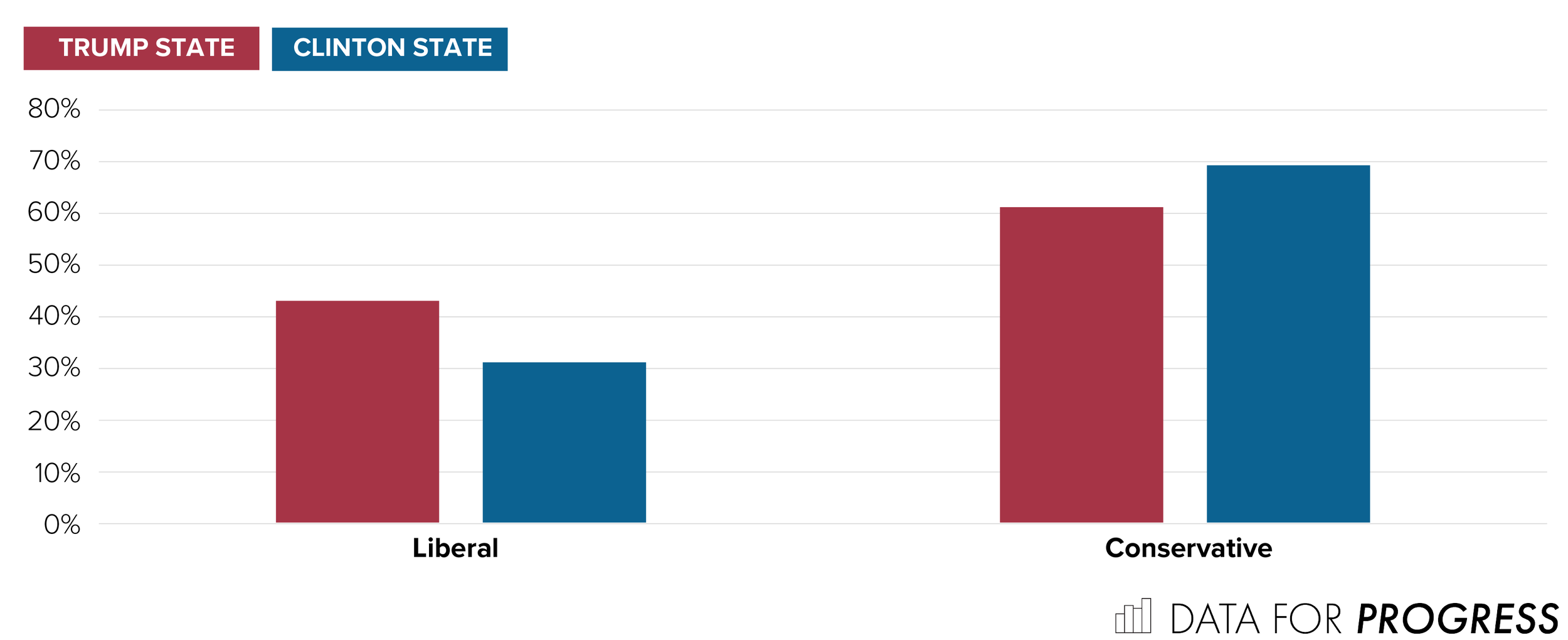Public Opinion about Federalism during the Coronavirus Pandemic
By Deborah J. Schildkraut, Jeffrey M. Berry, and James M. Glaser
A few months ago, the three of us began exploring public opinion about federalism and the role of ideology in shaping whether people tended to prefer that the federal government or state and local governments address political issues. We quickly learned two things. First, there is not much polling on preferred level of government, and most of what we were able to find was asked during the Obama administration. Second, perhaps not surprisingly, liberals were more likely than conservatives to evaluate the federal government positively while conservatives tended to prefer that the federal government leave things to the states and localities. This was true when questions asked about the federal government generally and when questions asked about specific public policies. What we were not able to determine from these questions is whether this pattern was due to respondents’ ideological orientation or to the ideological orientation of the incumbent in the White House. In other words, we wondered whether conservatives would opt for greater federal control relative to the states when their side was in control. So when we were presented with an opportunity to suggest questions for a Data For Progress survey about the coronavirus pandemic, we jumped at the chance. Some questions are identical to questions asked during the Obama years while others we added are specific to the pandemic.
We expected to find one of three patterns: (1) conservatives have principled reasons for preferring a smaller federal government and patterns from the Obama years would continue to hold even though one of their own is now at the helm of the federal government; (2) conservatives would still dislike the federal government relative to liberals but the gap between the two groups would shrink. That is, conservatives would shift toward more support for the federal government but their support would not surpass that of liberals; or (3) there would be a reversal, with liberals now less likely than conservatives to prefer the federal government over state and local governments when it comes to addressing public policies. As with any study, our results in some places are mixed but by far, the most common outcome our results show is the third one. In our current moment, the ideological roles are reversed: conservatives are more likely than liberals to put their trust in the federal government in general and for the pandemic specifically. Although other surveys being done now may also show high levels of support for the federal government and the Trump administration among conservatives, the Data for Progress survey is unique in that it allows for direct comparisons with surveys conducted years earlier.
In 2010, the Pew Research Center asked Americans, “All in all, how good a job does the federal government do running its programs?” and we asked it again now. The graph below shows the percent saying that the federal government does a “poor job” in both surveys. In 2010, conservatives were more likely than liberal to say “poor” by 27 points. Today, liberals are more likely to say “poor” by about 10 points. It’s notable that there was a bigger shift in attitudes among conservatives than among liberals, something that shows up repeatedly.
In 2010, Pew asked “Is the federal government having a positive or negative effect on the way things are going in the country?” DFP included this question as well in its most recent survey. In the graph below, we again see a large reversal among conservatives. The percent saying the effect of the federal government on the country is negative dropped by 45 percentage points (77 percent to 32 percent). The views of liberals remained stable. Most importantly, conservatives are now less likely than liberals to say the effect of the federal government is negative.
In 2012, Pew asked respondents if they agree or disagree that “the federal government should run only those things that cannot be run at the local level.” At that time, conservatives were predictably, more likely than liberals to agree: 84 percent vs. 56 percent a difference of 28 points, as seen in the graph below. When Data for Progress asked this question now the percent agreeing increased for everyone, but it increased more for liberals than for moderates or conservatives. Liberals went from 56 percent to 69 percent, an increase of 13 percentage points. Here, we suspect liberals may be conveying federalism preferences in light of the progressive bent of many large cities and to some of the governors in our most populous states. For conservatives, the modest increase in their support for this question may be a function of the president’s continual disparagement of the federal government that he leads. There may also be a ceiling effect: support among conservatives was already high, making it hard to grow at the same rate as for liberals and moderates.
When it comes to the coronavirus, Data for Progress asked people which level of government they feel should be responsible for handling the pandemic and which level of government they trust more to handle it: the federal government or their own state government. Note that people weren’t asked about state governments in general; rather, they were asked specifically about their own state government. Respondents overwhelmingly thought that the federal government has responsibility for handling the pandemic relative to their state government regardless of ideology: 79 percent of liberals, 76 percent of moderates, and 75 percent of conservatives. But when asked which level of government they trust to handle the pandemic, ideology matters considerably, with conservatives far more likely than liberals to say that they trust the federal government: 37 percent of liberals and 64 percent of conservatives trust the federal government more than their own state government to handle the pandemic (along with 47 percent of moderates). This is hardly a finding one would expect to see if each side were exhibiting the traditional stances associated with the principles underlying their ideological orientations.
Finally, we wondered whether the effect of ideology on one’s level of trust in the federal government to handle the pandemic relative to their state government depended on whether respondents live in a red state or a blue state (measured here by whether Hillary Clinton or Donald Trump won their state in the 2016 election). Our results, in the graph below, show that the political orientation of one’s state matters. Conservatives in states Clinton won were 8 points more likely to put their trust in the federal government instead of their state government compared to conservatives in states Trump won. For liberals, being in a state Clinton won lowered their trust in the federal government to handle the pandemic by 12 points. For both liberals and conservatives, being a state that aligns with one’s ideology lowers trust in the federal government relative to one’s state. For liberals, this means that they trust their state government more if they are in a Democratic state. Conservatives trust their state government more if they are in a Republican state. When one’s views and the political leaning of one’s state don’t align, they look to the federal government to address the pandemic. It’s also noteworthy that a majority of liberal respondents trust their state government more than the federal government to handle the pandemic regardless of the political orientation of their state.
This crisis has put the debate about federalism into the public spotlight like almost nothing else. One can even find “Articles of Confederation” trending on social media. The question of which level of government owns which policies and has which responsibilities is asked almost daily, of the president, of state, and of local officials. The president himself rooted the issue not just in what is most effective or expedient, but in broader claims about the proper relationship between different levels of government. One key takeaway from our analysis is that at this point in time, the central philosophical difference between liberals and conservatives over the scope of government seems to have given way to partisanship, especially for conservatives, who demonstrated the biggest swing in attitudes over time. Today, their belief in the Republican party seem to far outweigh their ideological commitment to small government. It’s also important to note that our analysis only examines broad questions about trust and responsibility. Questions about specific matters as they related to federalism, such as health care and rebuilding the economy, should be studied as well.
Deborah J. Schildkraut is Professor and Chair of the Department of Political Science at Tufts University.
Jeffrey M. Berry is Skuse Professor of Political Science at Tufts University.
James M. Glaser is Professor of Political Science and Dean of the School of Arts and Sciences at Tufts University.




